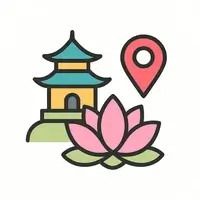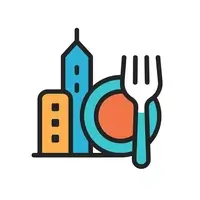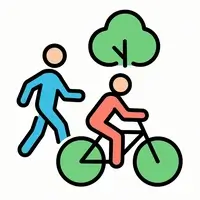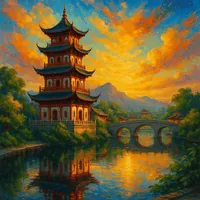
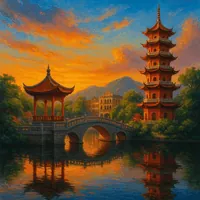
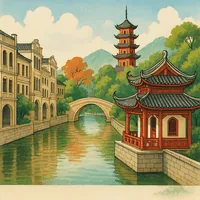
Jiangmen, China
Population: 4,630,300
Nestled in Guangdong Province, Jiangmen distinguishes itself with its deep-rooted Overseas Chinese heritage, as evidenced by the unique architecture of the Kaiping Diaolou—UNESCO World Heritage Sites. These multi-storied defensive towers blend Chinese and Western elements, reflecting the city's century-long embrace of diaspora influences. Furthermore, Jiangmen's innovative development of the Wuyi Overseas Chinese Museum highlights its commitment to preserving cultural narratives, making it a singular bridge between China and its global emigrants.













Notable points about Jiangmen
- Cultural Heritage: Jiangmen, often referred to as the "Hometown of Overseas Chinese," boasts a rich cultural heritage, with numerous ancestral halls and historical sites. This connection to the diaspora is celebrated through the Kaiping Diaolou and Villages, a UNESCO World Heritage Site, showcasing unique, fortified multi-story towers that blend Chinese and Western architectural elements.
- Merging Traditions and Modernity: Unlike many other Chinese cities, Jiangmen successfully merges traditional charm with modern development. The city's architecture and lifestyle reflect both its historic ties and contemporary growth, offering a unique urban experience that attracts those interested in both cultural heritage and modern conveniences.
- Ecotourism and Natural Beauty: Perfect for nature enthusiasts, Jiangmen is surrounded by stunning landscapes, including the famous Mount Guifeng, known for its picturesque hiking trails and lush scenery, making it a prime destination for outdoor activities and eco-tourism.
- Economic Zone and Business Opportunities: Jiangmen is part of the Greater Bay Area, one of China's most dynamic economic zones. This provides numerous opportunities for entrepreneurs and investors looking to tap into China's burgeoning economic landscape while being part of an interconnected urban conglomerate.
- A Haven for Families: With its blend of well-planned urban areas and abundant green spaces, Jiangmen offers a high quality of life, making it an ideal city for families. It also has reputable educational institutions, diverse cultural facilities, and family-friendly neighborhoods.
- Popular Culinary Scene: Food lovers are treated to an authentic Cantonese culinary experience in Jiangmen, known for its local specialties such as Jiangmen dandan noodles and a wide variety of fresh seafood, showcasing the region's rich gastronomic tradition.
- Romantic Getaway Destinations: Jiangmen's natural landscapes, like Baishuidai Forest Park, provide stunning and serene environments ideal for couples looking for romantic retreats or quiet escapes from urban hustle and bustle.
- Unique Festivals and Events: Jiangmen hosts a range of traditional festivals and events, such as the Dragon Boat Festival, featuring vibrant and dynamic boat races, providing visitors with glimpses into local customs and communal festivities.
- Thriving Creative Scene: With its rich history and contemporary development, Jiangmen is nurturing a growing creative and artistic community, offering plenty of opportunities for artists, writers, and creatives who seek inspiration in a city that respects its past while embracing new ideas.
- Distinguished Local Dialect: The people of Jiangmen speak a unique dialect called Taishanese, setting it apart from other Chinese cities. This linguistic trait offers a distinct cultural experience, illustrating the city's diverse cultural and historical tapestry.
Summarized Traveller Reviews
Jiangmen's Neighborhoods
Pengjiang District
🎯 Key Attractions
- Jiangmen Star Park: A scenic riverside walkway dotted with statues of famous Cantonese stars, evoking a Walk of Fame vibe with a Pearl River twist.
- Wuyi Overseas Chinese Museum: Traces the footprints of Jiangmen’s diaspora across the globe—think of it as the local version of a 'homecoming Netflix documentary'.
- Time Traveller Teahouse: An atmospheric café where retro vinyl meets Cantonese opera—quiet enough to lose track of the decade.
✨ Unique Aspects
Combines riverside promenades, expat cafés, and cinematic views that linger like the final scene of an old Hong Kong film.
Jianghai District
🎯 Key Attractions
- Jianghai Industrial Museum: A monument to the city’s manufacturing legacy, where gearheads feel like they're in a Cantonese version of *Modern Times*.
- Yongfu Park: Locals come here to stretch, stroll, or simply sit under a fig tree and vanish into their own thoughts.
- Concrete Rose Sculpture Alley: Graffiti-covered shipping containers turned into moody sculptures—it’s Banksy by way of Bao’an.
✨ Unique Aspects
Blends quiet factory-town melancholy with creative sparks—perfect for a slow wander after rain.
Xinhui District
🎯 Key Attractions
- Guifeng Mountain: Misty trails and temples that rise like a Studio Ghibli background come to life.
- Chenpi Village: The scent of dried tangerine peels infuses every cobblestone corner—it’s part living museum, part sleepy backlot.
- The House of Whispering Bells: A restored Qing-era mansion that rings out soft chimes when the wind turns—locals claim it hums with ancestral sighs.
✨ Unique Aspects
Home to legendary Chenpi (aged citrus peel) and quiet hill paths where even birds seem hesitant to interrupt the silence.
Duruan
🎯 Key Attractions
- Jiangmen Innovation Park: Glass buildings, coworking hubs, and 5G dreams—China’s own answer to 'Silicon Valley: The Prequel'.
- CloudNine Bookstore Café: More introspective than Instagrammable—best known for its ‘mute Mondays’ policy.
- Quantum Steps Art Stairs: Each riser painted with surreal coding poetry—because even stairs here want to go somewhere profound.
✨ Unique Aspects
An up-and-coming tech haven where latte art meets late-night code sprints.
Chengnan
🎯 Key Attractions
- Chengnan Old Street: Faded shop signs and hidden noodle joints make it feel like stepping into a sepia photo.
- Tianzhong Park: A peaceful green space where morning tai chi and evening mahjong fill the hours in between.
- Memory Lane Dumpling House: Serves soup dumplings with a side of silent black-and-white films playing in the background.
✨ Unique Aspects
Feels like a place your grandparents might've courted in, if WeChat didn’t exist yet.
Shuangshui
🎯 Key Attractions
- Shuangshui Bridge: An arched stone bridge perfect for 4 a.m. foggy photos or thinking about that old Li Bai poem you forgot.
- Lantern Fisherman Dock: A local ritual of lighting small lanterns as offerings at dusk—part prayer, part poetry.
- The Paper Boat Workshop: A tiny family studio that crafts origami boats with old rice paper and new hope.
✨ Unique Aspects
Where silence isn’t absence, but presence—an ode to river life.
Tangxia
🎯 Key Attractions
- Tangxia Night Market: Glowing lanterns, sizzling skewers, and a soundtrack of motorbikes and pop ballads.
- Neon Peacock KTV: Where broken hearts go to belt Cantopop under disco lights until sunrise.
- 24-Hour Porridge Pavilion: Locals swear the congee here can mend hangovers—and sometimes hearts.
✨ Unique Aspects
Feels like a Wong Kar-Wai film paused just before the lovers part.
Baisha
🎯 Key Attractions
- Baisha Canal Path: Stone paths where fishermen and painters nod to each other across centuries.
- Ink&Lotus Studio: An artist collective tucked inside a former tofu warehouse—quiet, pungent, and brilliant.
- The Cat Balcony: A second-story café run by rescued felines and a retired philosopher.
✨ Unique Aspects
A secret sketchbook of the city, meant for quiet discovery and the occasional haiku.
Hetang
🎯 Key Attractions
- Hetang Lotus Lake: Lotuses sway while elders play chess in silence—it’s Jiangmen’s version of an unplugged weekend.
- Dragon Gate Archway: An ornate gate marking the start of a lane that whispers its way into old family gardens.
- The Soundless Library: A private bookshop where silence is enforced not by rules, but reverence.
✨ Unique Aspects
Equal parts water and memory—a quiet cradle for elder poets and early risers.
Tanjiang Riverside (Heshan side)
🎯 Key Attractions
- Tanjiang Walkway: Winding along the water with views that fade like a long-exposure photograph.
- River Tea Studio: Offers hand-poured brews and windows that frame the world like ink scrolls.
- Floating Poetry Station: An old barge converted into a floating book café—you come for tea, you stay for the metaphors.
✨ Unique Aspects
A riverfront that doesn’t shout for attention, but hums softly with it.














